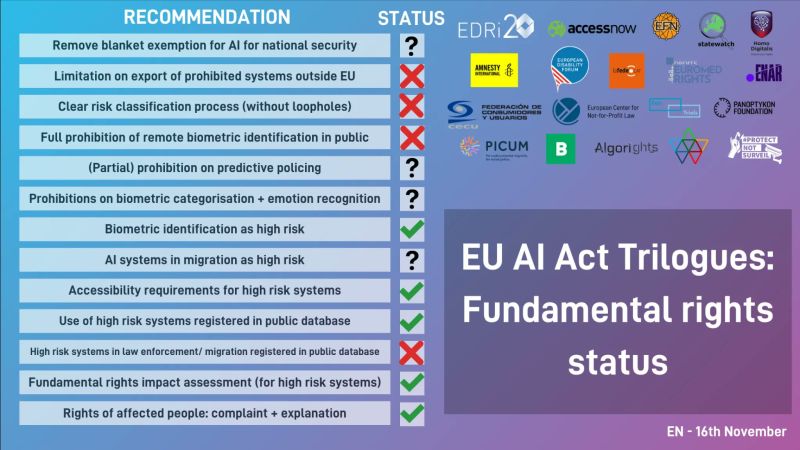We have prepared an easy-to-read infographic on developments at the AI Act trilateral conferences
How are the tripartite conferences progressing in the context of the adoption of the proposed EU AI legislation?
Together with European Digital Rights and other key civil society organisations we have been working closely with over the last few years on this legislative dossier, we have prepared a graphic to highlight where we are with meeting our demands for the protection of Human Rights.
We have achieved significant improvements, but unfortunately there are still many provisions that do not meet our requests. You can read more on the relevant here.
Homo Digitalis in Brussels for meetings with MEPs on CSAM
Last week Homo Digitalis travelled to Brussels!
There we participated in awareness raising activities with European Digital Rights regarding the proposed regulation on preventing and combating child sexual abuse (#CSAR) and met with Greek and Cypriot MEPs and their groups in the European Parliament to discuss it!
We would like to thank our members Angelina Barla, Charalambos Daftsios, Haris Kiritsis, George Sarris and Nikoleta Georgakopoulou for their excellent representation!!!
You can read more about our visit to Brussels here.
The European Parliament did not adopt our request for a complete ban on the use of spyware in the EMFA provisions
Yesterday, the European Parliament adopted its proposed provisions for the Regulation establishing a common framework for media services in the internal market (EMFA). Now the proposed texts enter the next legislative phase: the trilogue conferences.
Already last week, together with 80 other civil society organisations, journalists and journalists’ unions, we had sent an open letter to MEPs calling on them to adopt a complete ban on the use of spyware, which is a direct attack on our democratic societies and the protection of Human Rights.
Unfortunately, MEPs did not adopt this proposal, but we have enough time to exert pressure and turn the situation around in the trilogue phase.
In Greece we have seen reputable journalists with very important research work being targeted by such spying software, and it is the duty of all of us to join our voices to protect press freedom and independent journalism.
The European Parliament plenary voted to ban mass biometric surveillance in public places
The European Parliament plenary voted today on its text on the proposed legislation on Artificial Intelligence (AI Act).
The ban on mass biometric surveillance in public places in real time was adopted by the plenary with 335 votes in favour to 235 votes against. We are very proud of the outcome of this vote, despite the fact that there remain provisions in the proposed legislation that pose significant challenges to Human Rights!
But how did our representatives vote? On 25/5, Homo Digitalis had sent open letters to all Greek MEPs, so that no one can claim not to know what is at stake in today’s vote.
We are glad that MEPs Arvanitis, Kokkalis, Kouloglou, Kountoura, Kirtos, Papadimoulis, and Papandreou voted in favour of maintaining the position of the IMCO and LIBE Committees of the European Parliament on the ban. We are concerned that MEPs Vozemberg-Vryonidis, Zagorakis, Kefalogiannis, Meimarakis and Spyraki voted against maintaining this position, and we remain at their disposal to highlight with our positions and arguments the need for a ban on mass biometric surveillance in public places in real time without exceptions.
Nothing has been decided yet, however, as the trilateral negotiations are now beginning!



